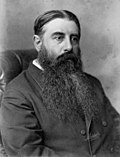 |
|---|

The Postmaster-General in New Zealand was the government minister responsible for the New Zealand Post Office (NZPO) from 1858 to 1989, when the NZPO (formerly the Post and Telegraph Department) was split into three State Owned Enterprises, responsible to the Minister of State Owned Enterprises: New Zealand Post Limited, Telecom New Zealand Limited, and Post Office Bank Limited.











































